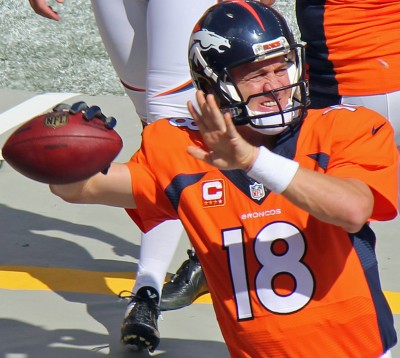
It’s hard to look at today’s popular athletes and think of them as equals.
Every day, we personify and admire them with gratitude as we debate their greatness on TV shows and at bars. We think about them when we’re playing video games and pray for them before we go to sleep. We revere them and call them “legends” as they walk out into the twilight of their careers. We honor them and idolize them because we are captivated by their brilliance.
But just because they have their own shoe deals and have a blue check next to their names on Twitter doesn’t mean they have the right to hurt innocent people and hide behind their actions.
They may get the biggest tables at the nightclubs, they may get to skip the lines at the college bars and they may even get away with a few things that “ordinary folks” can’t, but athletes are not gods.
However, for the past couple decades, Peyton Manning has been treated like one. He’s part of “football’s first family,” and he’s one of the greatest quarterbacks of all time. For a multitude of reasons — mainly his family, his career and his “likability” — Manning has always been placed on a pedestal above the Earth and into the heavens. He has always been “the good guy quarterback” and the player your father would point to and say, “That’s how you should conduct yourself.”
But after learning about the alleged sexual assault Manning committed in a University of Tennessee locker room two decades ago, it is clear that the future Hall of Famer is no role model. In fact, he’s the last thing from it.
Peyton Manning is not a god.
This side of Manning’s story began in 1996 when, according to an employment discrimination complaint filed by Jamie Naughtright that same year, Manning allegedly, “pulled his pants down and exposed himself to [Naughtright], as [she] was bent over examining his foot.”
Naughtright would settle that case with Tennessee, but her battle against Manning was just beginning. After the book, “Manning: A Father, His Sons, and His Football Legacy,” was published in 2001, Naughtright filed a defamation lawsuit against Archie and Peyton Manning along with the book’s publisher, Harper Collins, for the way Manning described Naughtright in the book as “vulgar.”
The defamation lawsuit was settled in 2003, but documents released by the New York Daily News last week and a story written by The Daily Beast a few weeks earlier show the side of Manning that has never been properly portrayed in the media.
This isn’t the first time Manning’s alleged sexual assault has made its waves around the sports world, but it certainly feels like it, in part thanks to social media. Naughtright’s initial complaint was reported by various media outlets in 1996, and USA TODAY wrote about the defamation lawsuit in 2003, but for the next 13 years it would be a tiny spectacle in Manning’s story arc.
The five-time NFL MVP would go on to have one of the most prolific careers in NFL history without an inch of his alleged sexual assault ever leaching into his legacy.
Why? Sadly, there is no clear answer to that question other than the fact that it was decided a long time ago that the alleged sexual assault wasn’t going to be a part of Manning’s narrative. Manning has become a sacred figure in the football world, and the Manning family has become an institution that is just as powerful.
But none of that matters, and it never should have. Manning is not a god, and he should have never been treated like one.
In the years following Manning’s alleged assault, it appears that the culture inside Tennessee athletics never improved and continued to be a hostile place for women.
Tuesday, a group of women filed a lawsuit against the University of Tennessee alleging that the university violated Title IX regulations and created a “deliberate indifference to known sexual assaults so as to create a hostile sexual environment.”
Manning and nine other Tennessee student-athletes are named in the lawsuit. Two of those are former football players, A.J. Johnson and Michael Williams, who were indicted on aggravated rape charges and will each go on trial this summer.
Tennessee is in the headlines currently, but it’s far from the only institution across the country that has faced Title IX lawsuits and allegations of athletes committing sexual assaults.
Former Florida State quarterback and Heisman Trophy winner Jameis Winston was accused of sexual assault but was not indicted after the state attorney decided not to file charges against him in December 2013. Last month, Winston’s accuser, Erica Kinsman, settled a lawsuit with the university for $950,000, but the university is still under a Title IX investigation by the Department of Education’s Office for Civil Rights.
At Baylor University, multiple football players have been found guilty of committing horrendous crimes against female students. In August 2015, former defensive lineman Sam Ukwuachu was found guilty of sexual assault and in 2014, Tevin Elliot was sentenced to 20 years in prison for sexual assault.
But the Baylor administration has been accused of failing to investigate claims of rape and sexual assault. An ESPN “Outside The Lines” investigation discovered that several women were turned away by the Baylor administration after reporting that Elliot had raped them.
According to “Outside The Lines,” five women reported to Baylor administration that Elliot had sexually assaulted them between 2009 and 2012, and the Baylor football player faced no repercussions from the school until he was arrested. The victims said Baylor officials tried to talk them out of pursuing criminal action against Elliot and were told they couldn’t receive any help from the university.
Like so many other institutions, Baylor views its football players as gods, and sadly, too many victims have had to pay the price for this way of thinking. It’s not just at Baylor, Florida State and Tennessee – it’s everywhere. It’s become an epidemic, and we have to do something to change this horrible culture.
Athletes have a tremendous platform to inspire and captivate us, but no matter how successful and powerful they may become, we must never forget that they are not above the law. Maybe someday we will no longer be content with the way we glorify our athletes, but for now, I must say it again.
Athletes are not gods.
Isaac is a sports columnist for The Daily Free Press and a High School Sports Correspondent for The Boston Globe. Born and raised in Columbus, Ohio, Isaac spent the 2015 summer interning at USA TODAY Sports and For The Win. Aside from his love of sports, Isaac has a severe Chipotle addiction and an unhealthy love affair with Ohio State football. Follow him on Twitter @IsaacChipps

